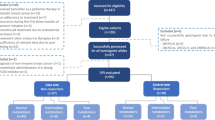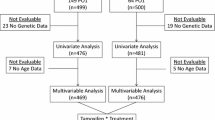Abstract
CYP2D6 plays a major role in the metabolism of tamoxifen, and polymorphism of P-glycoprotein has been associated with resistance of many drug therapies. This study investigates the clinical impact of genetic variants of CYP2D6 and ABCB1 in breast cancer patients treated with tamoxifen. Blood samples from 95 breast cancer patients treated with tamoxifen were collected and genotyped for CYP2D6 and ABCB1 variants using allele-specific PCR method. Recurrence risks were calculated using Kaplan–Meier analysis and compared using the log-rank test. Patients carrying CYP2D6*10/*10 and heterozygous null allele (IM) showed higher risks of developing recurrence and metastasis (OR 13.14; 95% CI 1.57–109.94; P = 0.004) than patients with CYP2D6*1/*1 and *1/*10 genotypes. Patients with homozygous CC genotypes of ABCB1 C3435T showed a shorter time to recurrence. Patients who were CYP2D6 IM and homozygous CC genotype of C3435T have statistically significant higher risks of recurrence (P = 0.002). Similarly, median time to recurrence in these patients was only 12 months (95% CI = 0.79–23.2) compared to those without this combination which was 48 months (95% CI = 14.7–81.2). Patients with CYP2D6 IM and homozygous CC genotype of ABCB1 C3435T have shorter times to recurrence. The results confirmed the findings of previous studies and support FDA recommendation to perform pre-genotyping in patients before the choice of therapy is determined in breast cancer patients.


Similar content being viewed by others
REFERENCES
Fisher B, Costantino JP, Wickerham DL, Redmond CK, Kavanah M, Cronin WM, et al. Tamoxifen for prevention of breast cancer: Report of the National Surgical Adjuvant Breast and Bowel Project P-1 Study. J Natl Cancer Insts. 1998;90:1371–88.
Osborne CK. Tamoxifen in the treatment of breast cancer. N Engl J Med. 1998;339:1609–18.
Girault I, Bi'eche I, Lidereau R. Role of estrogen receptor transcriptional. Coregulators in tamoxifen resistance in breast cancer. Maturitas. 2006;54:342–51.
Lim HS, Ju Lee H, Seok Lee K, Sook Lee E, Jang IJ, Ro J. Clinical implications of CYP2D6 genotypes predictive of tamoxifen pharmacokinetics in metastatic breast cancer. J Clin Oncol. 2007;25:3837–45.
Goetz MP, Knox SK, Suman VJ, Rae JM, Safgren SL, Ames MM, et al. The impact of cytochrome P450 2D6 metabolism in women receiving adjuvant tamoxifen. Breast Cancer Res Treat. 2007;101:113–21.
Eichelbaum M, Mineshita S, Ohnhaus EE, Zekorn C. The influence of enzyme induction on polymorphic sparteine oxidation. Br J Clin Pharmacol. 1986;22:49–53.
Steiner E, Bertilsson L, Sawe J, Bertling I, Sjoqvist F. Polymorphic debrisoquin hydroxylation in 757 Swedish subjects. Clin Pharmacol Ther. 1988;44:431–5.
Bertilsson L, Dahl ML, Sjoqvist F, Aberg-Wistedt A, Humble M, Johansson I, et al. Molecular basis for rational megaprescribing in ultrarapid hydroxylators of debrisoquine. Lancet. 1993;341:63.
Lim JSL, Chen XA, Singh O, Yap YS, Ng RCH, Wong NS, et al. Impact of CYP2D6, CYP3A5, CYP2C9 and CYP2C19 polymorphism on tamoxifen pharmacokinetics in Asian breast cancer patients. Br J Clin Pharmacol. 2011;71(5):737–50.
Xu Y, Sun Y, Yao L, Shi L, Wu Y, Ouyang T, et al. Association between CYP2D6*10 genotype and survival of breast cancer patients receiving tamoxifen treatment. Ann Oncol. 2008;19:1423–9.
Desta Z, Wars BA, Soukhova NV, Floackhart DA. Comprehensive evaluation of tamoxifen sequential biotransformation by the human cytochrome P450 system in vitro: prominent roles for CYP3A and CYP2D6. J Pharmacol Exp Ther. 2004;310:1062–75.
Kiyotani K, Mushiroda T, Sasa M, Bando Y, Sumitomo I, Hosono N, et al. Impact of CYP2D6*10 on recurrence-free survival in breast cancer patients receiving adjuvant tamoxifen therapy. Cancer Sci. 2008;99:995–9.
Loprinzi CL. Venlafaxine in management of hot flashes in survivors of breast cancer: a randomised controlled trial. Lancet. 2000;356:2059–63.
Jin Y, Desta Z, Stearns V, Ward B, Ho H, Lee KH, et al. CYP2D6 genotype, antidepressant use, and tamoxifen metabolism during adjuvant breast cancer treatment. J Natl Cancer Inst. 2005;97:30–9.
Leslie EM, Deeley RG, Cole SP. Multidrug resistance proteins: role of P-glycoprotein, MRP1, MRP2, and BCRP (ABCG2) in tissue defense. Toxicol Appl Pharmacol. 2005;204:216–37.
Tsukamoto F, Shiba E, Taguchi T, Sugimoto T, Watanabe T, Kim SJ, et al. Immunohistochemical detection of P-glycoprotein in breast cancer and its significance as a prognostic factor. Breast Cancer. 1997;4:259–63.
Kafka A, Sauer G, Jaeger C, Grudmann R, Kreienberg R, Zeillinger R, et al. Polymorphism C3435T of the MDR-1 gene predicts response to preoperative chemotherapy in locally advanced breast cancer. Int J Oncol. 2003;22:1117–21.
Kelleher D, Farrell R, McManus R. Pharmacogenetics of inflammatory bowel disease. Novatis Found Symp. 2004;263:41–53.
Cizmarikova M, Wagnerova M, Schono L, Habalova V, Kohut A, Linkova A, et al. MDR1 (C3435T) polymorphism: relation to the risk of breast cancer and therapeutic outcomes. Pharmacogenetics. 2010;10:62–9.
Tanabe M, Ieiri I, Nagata N, Inoue K, Ito S, Kanamori Y, et al. Expression of P-glycoprotein in human placenta: relation to genetic polymorphism of the multidrug resistance (MDR)-1 gene. J Pharmacol Exp Ther. 2001;297:1137–43.
Vargas-Roig LM, Gago FE, Tello O, Martin De Civetta MT, Ciocca DR. c-erbB-2 (Her-2/neu) protein and drug resistance in breast cancer patients treated with induction chemotherapy. Int J Cancer. 1999;84:129–34.
Teft WA, Mansell SE, Kim R. Endoxifen, the active metabolite of tamoxifen, is a substrate of the efflux transporter P-glycoprotein (MDR1). Drug Metab Dispos. 2011;39:588–62.
Teh LK, Ismail R, Yusoff R, Hussein A, Isa MN, Rahman AR. Heterogeneity of the CYP2D6 gene among Malays in Malaysia. J Clin Pharm Ther. 2001;26:1–7.
Ismail R, Teh LK. Genetic polymorphism of CYP2D6: Malaysian Indians have the highest frequency for CYP2D6*4 in Asia. Eur J Clin Pharmacol. 2001;57:617–8.
Ismail R, Teh LK, Amir J, Alwi Z, Lopez CG. Genetic polymorphism of CYP2D6 in Chinese subjects in Malaysia. J Clin Pharm Ther. 2003;28:279–84.
Teh LK, Lee WL, Amir J, Salleh MZ, Ismail R, Amir J, Alwi Z. Single step PCR for detection of allelic variation of MDR1 gene (P-glycoprotein) among three ethnic groups in Malaysia. J Clin Pharm Ther. 2007;32:313–9.
Lundqvist E, Johansson I, Ingelman-Sundberg M. Genetic mechanisms for duplication and multiduplication of the human CYP2D6 gene and methods for detection of duplicated CYP2D6 genes. Gene. 1999;226:327–38.
Steen VM, Andreassen OA, Daly AK, Tefre T, Borresen AL, Idle JR, et al. Detection of the poor metabolizer-associated CYP2D6 (D) gene deletion allele by long PCR technology. Pharmacogenetics. 1995;5:215–23.
Early Breast Cancer Trialists’ Collaborative Group (EBCTCG). Effects of chemotherapy hormonal therapy for early breast cancer on recurrence 15-year survival: an overview of the randomised trials. Lancet. 2005;365:1687–717.
Schroth W, Antoniadou L, Fritz P, Schwab M, Muerdter T, Zanger UM, et al. Breast cancer treatment outcome with adjuvant tamoxifen relative to patient CYP2D6 and CYP2C19 genotypes. J Clin Oncol. 2007;25:5187–93.
Schroth W, Goetz MP, Hamann U, Fasching PA, Schmidt M, Winter S, et al. Association between CYP2D6 polymorphisms and outcomes among women with early stage breast cancer treated with tamoxifen. JAMA. 2009;302:1429–36.
Toyama T, Yamashita H, Sugiura H, Kondo N, Iwase H, Fujii Y. No association between CYP2D6*10 genotype and survival of node-negative Japanese breast cancer patients receiving adjuvant tamoxifen treatment. Jpn J Clin Oncol. 2009;39(10):651–65621.
Okishiro M, Taguchi T, Jin Kim S, Shimazu K, Tamaki Y, Noguchi S. Genetic polymorphisms of CYP2D6 10 and CYP2C19 2, 3 are not associated with prognosis, endometrial thickness, or bone mineral density in Japanese breast cancer patients treated with adjuvant tamoxifen. Cancer. 2009;115:952–61.
Hoffmeyer S, Burk O, Von Richter O, Arnold HP, Brochmoller J, Johne A, et al. Functional polymorphisms of the human multidrug-resistance gene: multiple sequence variations and correlation of one allele with P-glycoprotein expression and activity in vivo. Proc Natl Acad Sci U S A. 2000;97:3473–8.
Taheri M, Mahjoubi F, Omranipour R. Effect of MDR1 polymorphism on multidrug resistance expression in breast cancer patients. Genet Mol Res. 2010;9:34–40.
Clifford SC, Thomas DJ, Neal DE, Lunec J. Increased MDR1 gene transcript levels in high-grade carcinoma of the bladder determined by quantitative PCR-based assay. Br J Cancer. 1994;69(4):680–6.
Pan JH, Han JX, Wu JM, Huang HN, Yu QZ, Sheng LJ. MDR1 single nucleotide polymorphism G2677T/A and haplotype are correlated with response to docetaxel-cisplatin chemotherapy in patients with non-small-cell lung cancer. Respiration. 2009;78:49–55.
ACKNOWLEDGEMENTS
This research is supported by a grant from the Ministry of Science, Technology and Innovation Malaysia (Grant no: 02-01-01-SF0173). We thank the director general of Ministry of Health Malaysia, Suzana Ismail and Khairussaleh Jalaludin for the approval and assistance in collection of patients’ samples.
Author information
Authors and Affiliations
Corresponding author
Rights and permissions
About this article
Cite this article
Teh, L.K., Mohamed, N.I., Salleh, M.Z. et al. The Risk of Recurrence in Breast Cancer Patients Treated with Tamoxifen: Polymorphisms of CYP2D6 and ABCB1 . AAPS J 14, 52–59 (2012). https://doi.org/10.1208/s12248-011-9313-6
Received:
Accepted:
Published:
Issue Date:
DOI: https://doi.org/10.1208/s12248-011-9313-6




